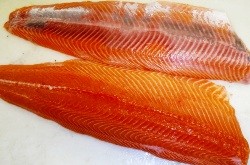
Product #: 11145FOFF
Scientific Name: Salmo Salar
Country of Origin: Chile
$15.95 /LB (minimum: 1 LB)The vast majority, over 99%, of Atlantic salmon available in the commercial market is farm raised. Farmed salmon have a milder, more delicate flavor than wild salmon. Their flesh is moderately firm and somewhat oily, though less so than wild Chinook (king) salmon. The color varies from orange to pinkish orange based on the amount of pigment added to the feed (not a dye added to the flesh of the fish as many people believe), which is meant to mimic the natural pigments in the prey species that wild salmon consume.
Atlantic salmon are native to the northern Atlantic Ocean, but are farmed in more than a dozen countries around the world including places like Chile where it is not native.
There are some serious sustainability issues in Chilean salmon aquaculture. The production system, open sea cages, leads to a great deal of interaction between the farm and the surrounding ecosystem. For this type of system to be sustainable there must be a great deal of monitoring conducted by the farm employees, the government, and ideally third party inspectors. The species being farmed, Atlantic salmon, is not native to the area but they do escape into the surrounding environment. These fish are competing with native species for resources and some farmed salmon are thought to have established breeding populations. Salmon are carnivorous and require certain levels of protein in their diet on the farm, but Chile is successfully substituting some agricultural protein and oil to reduce the demand for wild caught fish. Use of chemicals and drugs on salmon farms is nearly unregulated and very common. Bacteria and pests, such as sea lice, are beginning to develop immunities to these drugs and disease is a substantial problem in Chile. Waste from fish farms has been unregulated and unmonitored until recently and has affected the seabed communities underneath salmon cages. Recent regulations will require reductions in the amount of salmon in cages until conditions improve. The regulatory authority over salmon farms in Chile is spread between multiple government authorities and regulations seem to be lacking for this very large and still expanding industry.
This item has been added to your cart
Loading...